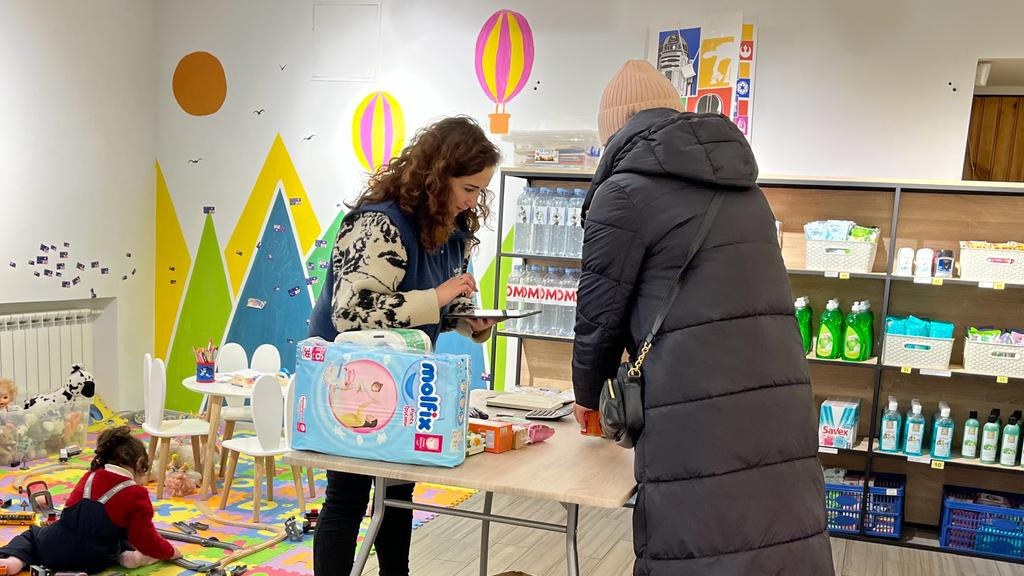Nisryn is 35 and has been living at LM Village refugee camp with her six children (aged 15, 13, 9, 6, 4 and 2) waiting well over a year to be reunified with their father in Germany.
Before the war
Nisryn was living with her family in Kobani, just south of the Turkish border. She went to college and then in 2001, started a family with her husband. He was a carpenter, they had 2 homes, a car, and life was good.
In 2013, Kobani was the site of military faction fighting. “The planes came and started to bomb everyone. Our house was hit. We lived in this house for one or two months with no water or electricity.”
Nisryn was heavily pregnant at the time so just six days after giving birth, the whole family left carrying just a few bags of their belongings.
The journey to Turkey
Together with a group of others, the family travelled by car to the Turkish border. A people smuggler showed them how to cross the border by foot at night and told them to head for the lights of a distant town.
But the walk was treachourous: “Because it was so dark, we couldn’t see anything – no light, nothing.” Some of the group, including her eldest son Sabri aged 11 at the time, fell down a trench, built to prevent people crossing there and it had barbed wire at the bottom of it. Sabri was badly cut although at the time he was more concerned about the damage to his new sports shoes.
They walked about 2 hours to the town where a car was waiting for them to take them to a bus station for the 18 hour journey to Istanbul.
Life in Istanbul
They lived in Istanbul for over two years in a home arranged for them by relative. Her husband worked as a carpenter there but her two eldest sons (Abdul aged 10 and Sabri aged 12 at the time) also worked making clothes to earn enough for the family. After a while, Sabri learnt Turkish and then worked as a translator for Syrians trying to make their way to Europe.
Her husband left Turkey after 2 years to try and make a better life, travelling first to Greece, then through Macedonia, Serbia and on to Germany. “Life was hard in Istanbul and he had to work all the time.”
After about six months, they decided to follow him. Nisryn says “It was better there than Syria because there were no bombs but everyone was working all the time and the family was not together.”
Sabri was working ten hours a day. He says: “I liked working, it was like I was responsible, like a man, working with men. But I want to be a footballer. And we were working all the time, there was no time for friends or anything.”
The journey to Greece
Her husband found someone who could arrange for them to leave, paying about $2,500. Nisryn was travelling alone with her six children, the youngest just one year old. She clearly found the experience highly traumatic and Sabri has to tell the story: “We took a car to the beach and there were so many people there. They loaded up two boats and we got in the second one with other people from Syria and Afghanistan. The Turkish coastguard tried to stop the boat. They told us to stop and wanted to arrest the man driving the boat but he was just a refugee like us. He said he would rather die than be arrested so we kept going even though two of the coastguard boats drove on either side of ours causing water to come into our boat. It took about four and half hours and then the Greek coastguard rescued us.”
They stayed at Mytilene on Lesbos island for about two weeks, were transferred to Athens for a few days and since then have been at LM Village. By the time they got to Greece (March 2016), the borders were shut and so the seven of them have been living at LM Village for nearly 18 months waiting for family reunification.

The next stage
Fortunately, they have just heard (August 2017) that their application for asylum in Germany has been successful and they will be reunited in Germany, hoping to travel there next month.
Nisyrn says she will learn German because she can’t go home. She asks what it is like there.
Sabri is irrepressible: “I want to go to school, to learn German and I hope to be a football coach.”



